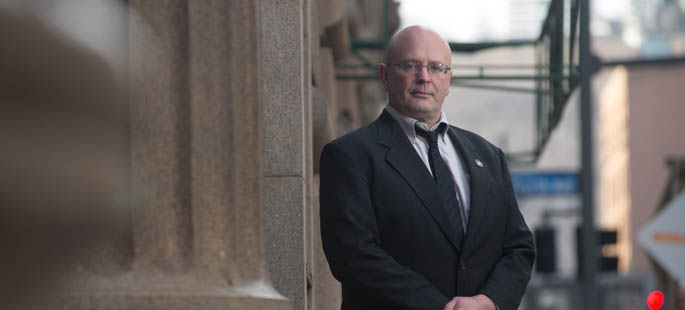Meet Sean Elliot Martin, Ph.D., Instructor of Criminal Justice and Intelligence Studies Wednesday, April 22, 2015

Sean Elliot Martin, Ph.D., was recently appointed a full-time instructor for the Department of Criminal Justice and Intelligence Studies. He taught as an adjunct instructor at Point Park for the past 15 years and was trained by a member of the CIA on presidential brief writing. Martin is an international freelance researcher and writer and serves as an unarmed combat instructor for members of the Pittsburgh Police Department and various military and security personnel. In addition to teaching, Martin is researching the connection between natural resource distribution and global conflict and crime.
Learn More
- Department of Criminal Justice and Intelligence Studies
- CJIS alumni and student success stories
- Schedule a campus visit
- Apply online
Tell us about your areas of research interest.
My educational background is rooted in composition and literature so my specialization in that area is cultural analysis. I've looked at how reality is created and manipulated and have studied cultural artifacts as a way to gain insight into the psychology of a culture. Currently, I'm researching the distribution of natural resources as a driver for global conflict and how it will influence strategic intelligence. Forensic psychology is another area I'm studying. I've always taken a very interdisciplinary approach to my research, overlapping literature with behavioral sciences.
What do you like best about teaching at Point Park?
The students. They are are extremely engaged and open to new experiences. They attack challenges with gusto rather than shrinking from them. Also, I really enjoy teaching in the criminal justice and intelligence studies department because it is extremely interdisciplinary and allows me to bring all of my areas of interest together. Faculty and administration have been great, too, and very supportive of all my ideas.
What courses are you currently teaching?
This semester I'm teaching Critical Thinking for Analysts, Intelligence Analyst/Critical Thinking and two sections of the Research Methods in Security and Intelligence Studies graduate course, one on campus and one online. I'm also assisting with administration duties for the criminal justice program.
How do you incorporate your real-world experience into the classroom?
I do research and writing for clients all over the globe so I'm able to share my knowledge of different cultures. Also, I just went to Japan to study the Tokyo Police Department so I have been sharing those experiences with my students along with experiences I had when I went to Egypt and Ecuador.
In addition, I teach survival combat to various police forces and can discuss with my students what I've learned from talking with law enforcement. I really try to get my students involved in activities such as the recent training exercise our intelligence majors assisted the 303rd Psychological Operations Unit with at the U.S. Army Reserves Center in Coraopolis.
What advice do you have for our criminal justice and intelligence studies students?
You need perseverance. There is no job in the world you are guaranteed to get out of school. It's important to build your resume through volunteer work and internships. There will be times when you really need to buckle down and focus, but in the end it will pay off. Don't get frustrated. Ask your professors for help and use every resource you can.

